 Petzlover
Petzlover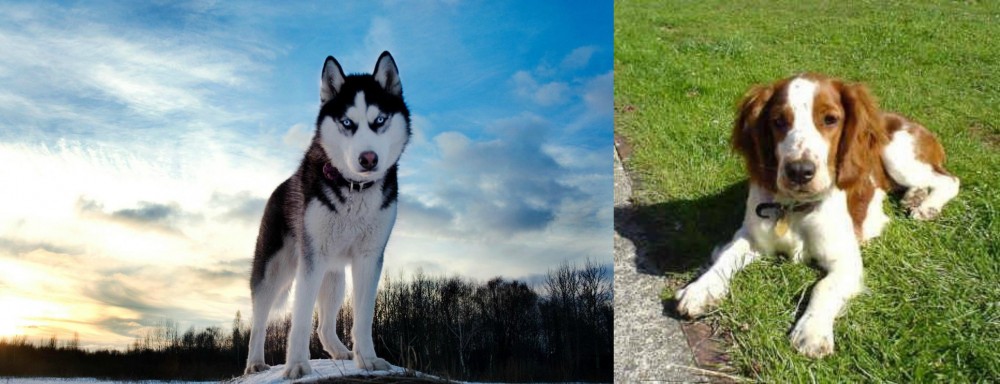 Alaskan Husky is originated from United States but Welsh Springer Spaniel is originated from United Kingdom. Alaskan Husky may grow 8 cm / 4 inches higher than Welsh Springer Spaniel. Both Alaskan Husky and Welsh Springer Spaniel are having almost same weight. Both Alaskan Husky and Welsh Springer Spaniel has almost same life span. Both Alaskan Husky and Welsh Springer Spaniel has almost same litter size. Alaskan Husky requires Low Maintenance. But Welsh Springer Spaniel requires Moderate Maintenance
Alaskan Husky is originated from United States but Welsh Springer Spaniel is originated from United Kingdom. Alaskan Husky may grow 8 cm / 4 inches higher than Welsh Springer Spaniel. Both Alaskan Husky and Welsh Springer Spaniel are having almost same weight. Both Alaskan Husky and Welsh Springer Spaniel has almost same life span. Both Alaskan Husky and Welsh Springer Spaniel has almost same litter size. Alaskan Husky requires Low Maintenance. But Welsh Springer Spaniel requires Moderate Maintenance
 Alaskan Husky is created to be a working dog who can do many different jobs like hauling logs, transport, supplies delivery, racing dogs, etc. Mushers created this breed. Alaskan Husky is created as a mix of Inuit dog, Siberian Husky, Greyhound and German pointers, and it is very difficult to find pure breed Alaskan Husky, and they are not recognized by any Kennel club.
Alaskan Husky is created to be a working dog who can do many different jobs like hauling logs, transport, supplies delivery, racing dogs, etc. Mushers created this breed. Alaskan Husky is created as a mix of Inuit dog, Siberian Husky, Greyhound and German pointers, and it is very difficult to find pure breed Alaskan Husky, and they are not recognized by any Kennel club.
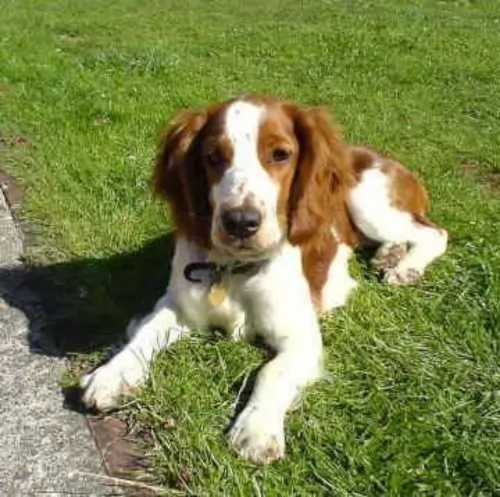 The Welsh Springer Spaniel is thought to be an old Land Spaniel similar to the English Springer Spaniel. They were pretty mush an unknown breed until they won a string of dog trials and became more popular. Following this surge the breed was recognized by the UKC in 1902 and were named the Welsh Springer Spaniel. No one really knows when the breed was developed and cannot be traced because of lack of documentation. They were brought to America in the early 1900’s and were recognized as a breed by the AKC (American Kennel Club) in 1906.
The Welsh Springer Spaniel is thought to be an old Land Spaniel similar to the English Springer Spaniel. They were pretty mush an unknown breed until they won a string of dog trials and became more popular. Following this surge the breed was recognized by the UKC in 1902 and were named the Welsh Springer Spaniel. No one really knows when the breed was developed and cannot be traced because of lack of documentation. They were brought to America in the early 1900’s and were recognized as a breed by the AKC (American Kennel Club) in 1906.
There are images of a dog looking a lot like the Welsh Springer Spaniel in old prints and pictures. The pictures are of a dog known as a Land Spaniel very much like the Welsh Springer Spaniel. These dogs were thought to be preserved by the Welsh and originally called the Welsh Starter. It was a hunting breed working with falcons.
At one point the breed was called the Welsh Spaniel and was also in the UK studbook as a Cocker Spaniel or a Welsh Cocker. There were several different types of Cocker Spaniels including the English Cocker, the Welsh Cocker, the Devonshire Cocker. The Welsh Cocker Spaniel was a solid dark color while the Welsh and Devonshire Cockers were liver colored.
Following World War II there were no dogs left in Wales or anywhere else in the United Kingdom whose parents were registered pedigree. The unregistered dogs were used to restart the breed and these dogs are the ancestors of the modern Welsh Springer Spaniel.
The breed is still rare with only 299 registered in the UK in 2016. They are listed now a vulnerable Native Breed.
 Alaskan Husky average weight depends from dog to dog, but on average male weights 21-25kg, while their height is moderate size. Females are slightly smaller than males, and they can weight 17-19kg.
Alaskan Husky average weight depends from dog to dog, but on average male weights 21-25kg, while their height is moderate size. Females are slightly smaller than males, and they can weight 17-19kg.
A lifespan of Alaskan Husky depends, again, from dog to dog, but it is 10-15 years. Of course, if you are taking care of your dog, they can live much longer.
Litter Size of average female is 4-10 puppies.
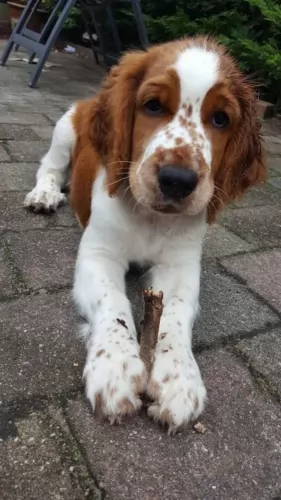 The breed is a medium size, solid and compact dog bred to work. Their forequarters are angled and there hindquarters are well developed. This is a very good looking breed that is only red with white markings. A hard working dog bred to hunt. They are slighter longer than tall and are not penalized as long as the height tis not greater than the length.
The breed is a medium size, solid and compact dog bred to work. Their forequarters are angled and there hindquarters are well developed. This is a very good looking breed that is only red with white markings. A hard working dog bred to hunt. They are slighter longer than tall and are not penalized as long as the height tis not greater than the length.
The tail in docked except in countries where it is illegal to do so. Their eyes should be brown. Noses are black or brown. The ears are small with a fethering like most setters. The show and field styles are the same. They are confused with the Engolish Springer Spaniel even though there are many differences. But both breeds are born to hunt and “spring” at the prey. They are smaller than the English Springer Spaniel and larger than the English Cocker Spaniel.
 Alaskan Husky is the best dog for the active people or families. They are bred to be working dogs. This breed is not created for it looks or pedigree, but this breed is bred purely to help with various tasks. They love being around the family, and they are very happy and cheerful. Alaskan Husky is not good watchdogs because they love everyone, including strangers. They are highly intelligent breed, but it can be tricky to train them sometimes. You must be a leader who makes decisions because if you are not confident, they will not see the reason for listening to you. The best way of training your dog would be with patience and firm, decisive manner. The old-fashioned way of training that includes punishment is not recommendable. They do not respond well to that. Training with awards is the best way to teach your dog. Alaskan Husky is a very active dog, so they are not very good for apartments. Although, you can have them in apartments but only if they have active walks and exercises. They love jogging, and they can be excellent buddies in any activity. They will love all the animals but it is important for them to socialize from the early age.
Alaskan Husky is the best dog for the active people or families. They are bred to be working dogs. This breed is not created for it looks or pedigree, but this breed is bred purely to help with various tasks. They love being around the family, and they are very happy and cheerful. Alaskan Husky is not good watchdogs because they love everyone, including strangers. They are highly intelligent breed, but it can be tricky to train them sometimes. You must be a leader who makes decisions because if you are not confident, they will not see the reason for listening to you. The best way of training your dog would be with patience and firm, decisive manner. The old-fashioned way of training that includes punishment is not recommendable. They do not respond well to that. Training with awards is the best way to teach your dog. Alaskan Husky is a very active dog, so they are not very good for apartments. Although, you can have them in apartments but only if they have active walks and exercises. They love jogging, and they can be excellent buddies in any activity. They will love all the animals but it is important for them to socialize from the early age.
 This breed has no any specific health issues. However, as any breed they can develop some issues that are related to genetics. It is very important to discuss with owners that you are getting the dog from, and if they are not ready to show medical records or proofs that dogs are healthy then you should be extra careful. If you do not have a lot of experience in getting a puppy or an adult dog, you should bring someone who has more experience. Again, this breed is very healthy and if you give them adequate caring with regular vet checks you will have a healthy and a happy dog for a long time.
This breed has no any specific health issues. However, as any breed they can develop some issues that are related to genetics. It is very important to discuss with owners that you are getting the dog from, and if they are not ready to show medical records or proofs that dogs are healthy then you should be extra careful. If you do not have a lot of experience in getting a puppy or an adult dog, you should bring someone who has more experience. Again, this breed is very healthy and if you give them adequate caring with regular vet checks you will have a healthy and a happy dog for a long time.
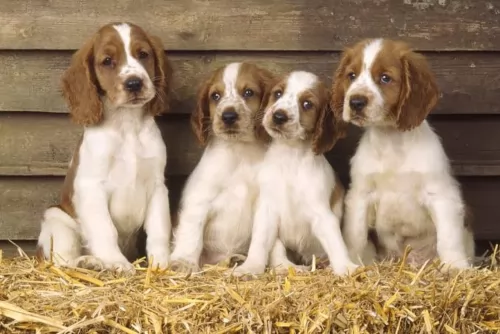 • Eye Diseases – Glaucoma can cause blindness; Entropian – eyelids curl inwards and can damage the cornea.
• Eye Diseases – Glaucoma can cause blindness; Entropian – eyelids curl inwards and can damage the cornea.
 Feeding Alaskan Husky, or basically any other dog depends on how active your dog is, and how big it is. Basically, if it is big and very active you will have to give it more food. On average, Alaskan Husky can eat 3-4 cups of high-quality dry food and that should be enough to keep them well-fed and healthy. You can always add vegetables, oil or fruits in their meal, but first, consult which additional food is the best for your dog. Carrots, broccoli, apples are always a good treat for any pet.
Feeding Alaskan Husky, or basically any other dog depends on how active your dog is, and how big it is. Basically, if it is big and very active you will have to give it more food. On average, Alaskan Husky can eat 3-4 cups of high-quality dry food and that should be enough to keep them well-fed and healthy. You can always add vegetables, oil or fruits in their meal, but first, consult which additional food is the best for your dog. Carrots, broccoli, apples are always a good treat for any pet.
Puppies eat more than an adult dog, so it would be perfect if you can divide small portions of food 3-5 times per day. It will help them develop into perfectly healthy adult dogs.
They are not very difficult to groom. Overall, Alaskan Husky does not need any special care, except twice a year during shed season. Then you have to brush them with a metal comb every day, but overall, occasional brushing and bathing when it is necessary is more than enough to have a healthy and perfectly groomed pet.
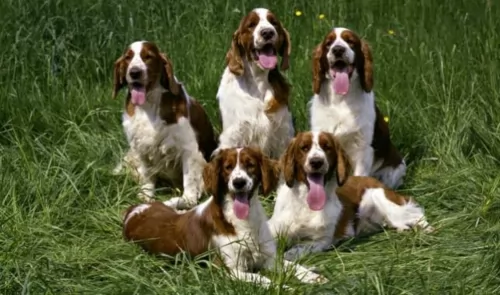 1Feeding the puppy active puppy. Feed breed specific or medium breed high quality dogfood. Feed ½ -3/4 cup in 2-3 meals
1Feeding the puppy active puppy. Feed breed specific or medium breed high quality dogfood. Feed ½ -3/4 cup in 2-3 meals
2.Feeding the adult active breed. Feed breed specific or medium breed high quality dogfood. Feed 1-1/2 cup in 1-2meals
4. Games and Exercises – Needs a secure fenced yard. Loves sports and outdoor activity. Agility, obedience, rally, tracking and loves to run, bike and hike.